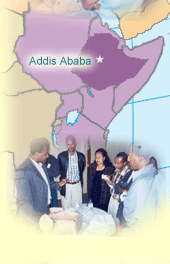
Prevention of Mother-to-Child Transmission
of HIV/AIDS
In collaboration with the Ministry of Health, HIV/AIDS Prevention Control Office, UNICEF and other partners, PRIME II was the lead implementer for the start-up of the Hareg Project to prevent mother-to-child transmission (PMTCT) of HIV/AIDS in Ethiopia. The project is funded through the Presidential Emergency Plan for AIDS Relief.
Hareg, or “vine” in Amharic, represents the intergenerational links that are critical in the fight against HIV/AIDS. According to the Ministry of Health, an estimated 200,000 children are infected with HIV in Ethiopia; more than 90% of HIV/AIDS infections in children are transmitted during pregnancy, delivery and breastfeeding. In a country where two thirds of mothers have no access to prenatal care, the Hareg partners are integrating PMTCT services with broader efforts to improve safe motherhood. In addition to HIV prophylaxis to HIV-positive women and their infants, the project provides prenatal, intrapartum and postpartum care, family planning counseling and services, and counseling on infant feeding options. Hareg also includes a Community Action for Behavioral Change component through which community members, groups and organizations design and implement activities to prevent HIV, generate demand for services, and reduce stigma and gender discrimination related to HIV/AIDS.
Key Results: Start-up activities included site and needs assessments, procurement and distribution of supplies, training of providers and other staff, and preparation of health management and information systems. Hareg was launched at 23 sites in early 2004 in the regions of Addis Ababa, Amhara, Beneshangul, Oromiya, Somali and Tigray.
Preventing Postpartum Hemorrhage
Highlighting the challenge of improving maternal and neonatal health in Ethiopia, less than five percent of mothers deliver their babies at a health facility with a skilled attendant. Complications are rarely managed properly, and incidence of postpartum hemorrhage is high. As part of a USAID-funded special initiative in four African countries, PRIME II trained 104 Ethiopian ob/gyns and nurse-midwives working in 24 facilities in active management of the third stage of labor (AMTSL), an intervention that significantly reduces postpartum hemorrhage. Many of the providers had previous training in AMTSL; however, the majority did not have the skills to perform AMTSL to WHO standards and were not applying the practice at their facilities.
In addition to strengthening delivery practices to include AMTSL, the project helped providers hone their prenatal counseling skills and conduct clinic talks and community outreach to stress the importance of birth preparedness and facility-based health services for safe motherhood. Collaborators in the project included the Ministry of Health and Family Health Department, the National Society of Ob/Gyns and the Ethiopian Midwives Association.
Key Results: Provider scores for overall performance of AMTSL increased from 80% at baseline to 86%. The percentage of providers performing AMTSL to standard increased from 48% to 73%. Use of AMTSL for vaginal births at the intervention sites increased from 1% to 90% (5,235/5,819 births).
Encouraging Communities to Abandon Female
Genital Cutting
Further hindering women’s health and safe motherhood in Ethiopia, the traditional practice of female genital cutting (FGC) is widely practiced, with surveys showing that as many as 80% of Ethiopian women have been circumcised. To permanently change such an ingrained cultural belief system, entire communities need to be involved.
In three regions with very high prevalence of FGC—Oromia, Harari and Somali—PRIME II collaborated with the Ministry of Health and the National Committee on Traditional Practices in Ethiopia to educate communities about the harmful effects of FGC on reproductive health. Focusing especially on women and community leaders, the project sought to understand the motives of “FGC demanders” and guide them toward information-based anti-FGC decisions; link FGC knowledge to health, gender, human rights and religious issues; and build community mobilization teams at the national, regional and grassroots levels. After a rapid appraisal of the five intervention sites, the project was launched in December 2002 with the establishment of a national Anti-FGC Women Leaders’ Team.
Key Results: A member of the Anti-FGC Women Leaders’ Team drafted a law against FGC that was passed by the Ethiopian parliament in July 2004. A forum of 83 prominent Muslim and Christian religious leaders organized through the project also issued an edict against the practice. In the targeted communities, more than 2,250 people participated in FGC education activities. Anti-FGC rules and penalties were written by community representatives and approved by community members in three project sites, and eight well-known circumcisers who had practiced FGC for 15 to 31 years promised publicly to cease performing the practice.
Building on results and lessons learned in PRIME II, IntraHealth continues to strengthen and scale-up reproductive health services in all regions of Ethiopia, focusing on maternal and child health, PMTCT and efforts to eliminate FGC.
Presentation on the Hareg Project (3,000KB)
|











